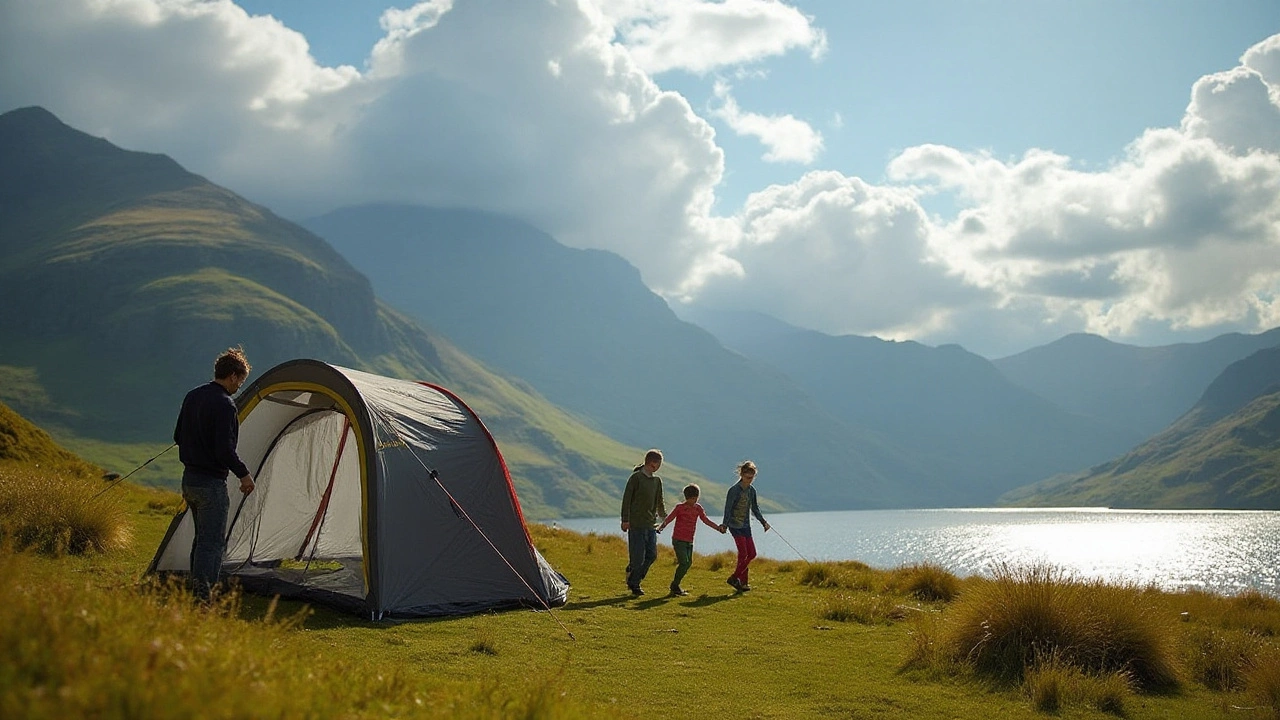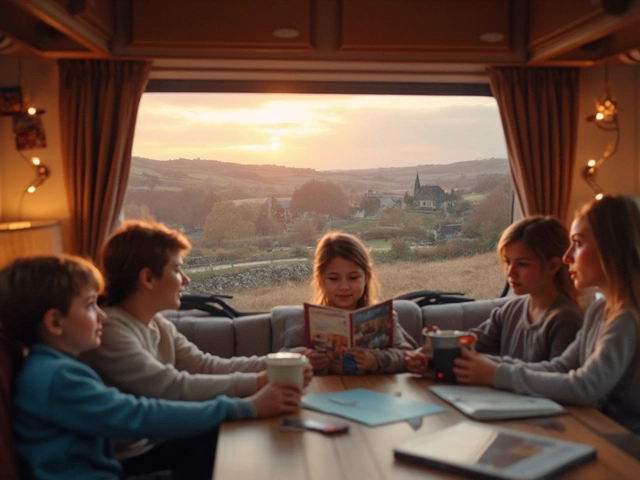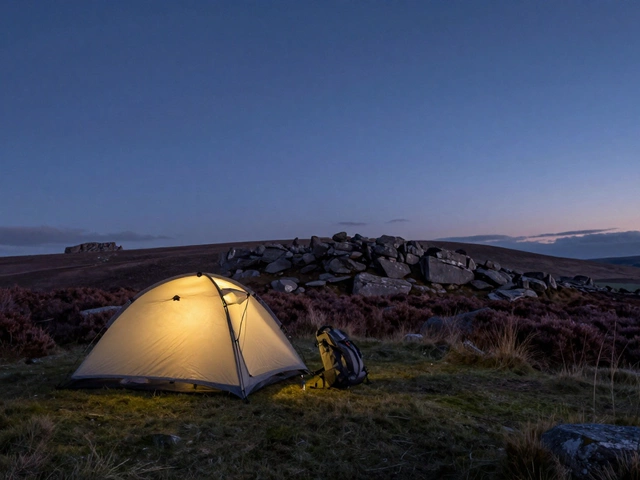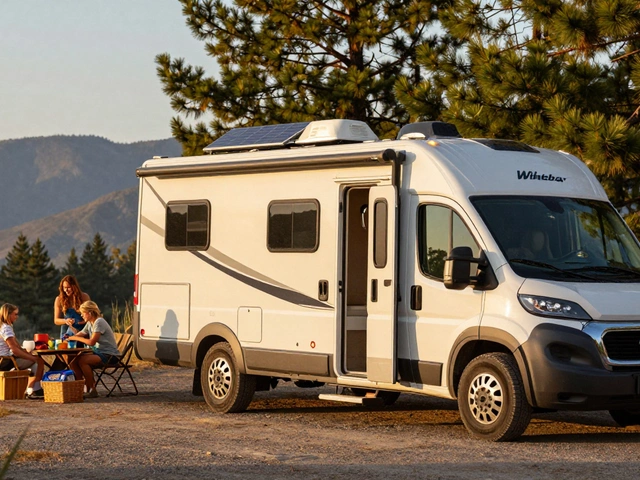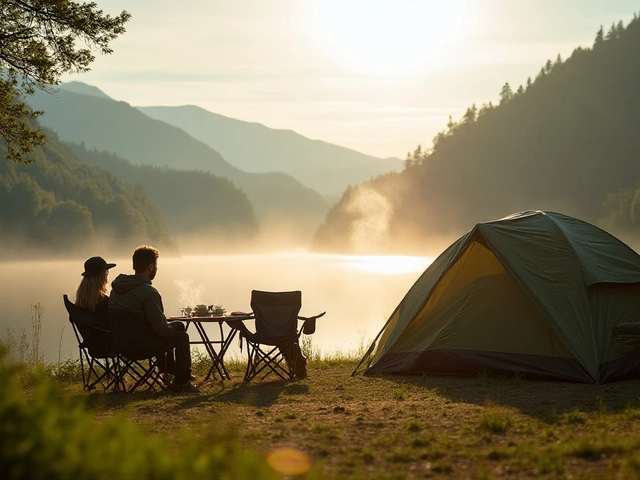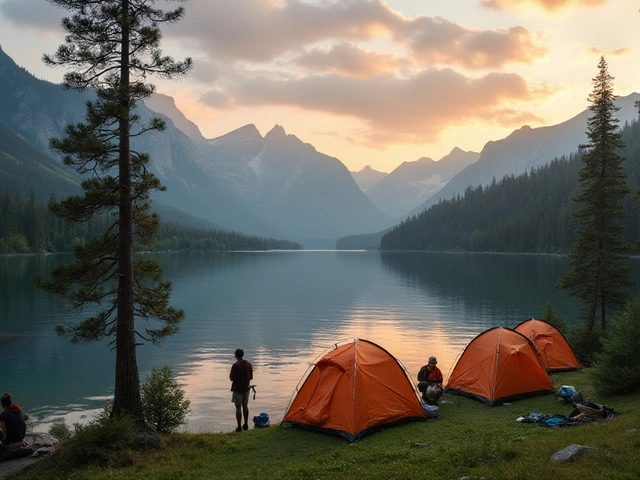Exploring the UK with a tent or caravan is one of life's simple pleasures. There's something uniquely charming about waking up to birdsong in the British countryside or falling asleep by the rustling waves along the coast. However, planning your camping adventure takes more than just a spirit of adventure—it requires some practical considerations, especially when it comes to booking campsites.
In the UK, the excitement around camping trips often leads people to ask whether they need to book in advance. While spontaneity adds a thrill, booking ahead can save you from the disappointment of full sites during peak times. It's a topic worth exploring to ensure you get the best out of your camping experience.
This article will walk you through the necessary steps and considerations when booking campsites in the UK, offering tips and insights into making your trip as seamless and enjoyable as possible. Whether you're a weekend wanderer or on an extended holiday, making informed choices about your campsite bookings can lead to better experiences and priceless memories.
- Why Book in Advance?
- Understanding UK Campsites
- Popular Destinations
- How to Book
- Tips for a Successful Booking
- Alternatives to Booking
Why Book in Advance?
In recent years, the allure of camping in the UK has gained momentum, drawing enthusiasts from cities and towns alike to the tranquil embrace of nature. Whether it's the rugged peaks of Scotland or the gentle rolling hills of Wales, UK campsites offer a refreshing escape. However, the rising popularity of camping and the limited availability of pitches at renowned spots make booking campsites in advance not just advisable, but often essential.
The primary reason to secure your site ahead of time is the assurance of availability. The best campsites in the UK—those with breathtaking views, pristine facilities, and recreational opportunities—tend to fill up quickly, particularly during school holidays and warm seasons. Popular destinations like the Lake District or Cornwall can see fully booked weekends months ahead. This demand not only reflects the beauty and amenities these sites offer but also the collective desire to savor the natural world, away from urban clatter.
"Camping in the UK during peak season without a booking is as risky as fishing in a dry pond," says an experienced camper, John Nicholson from the Camping and Caravanning Club.
Besides ensuring you have a spot, booking in advance allows you to choose the perfect location within a campsite, whether you prefer a secluded nook or a pitch near essential amenities. Planning your trip with foresight also means you can take advantage of any promotional offers or discounts, often available for early birds, which can significantly reduce the cost of your adventure. Cost-saving aside, having your trip sorted ahead gives you ample time to prepare, ensuring you have all the gear and provisions needed for a cozy and memorable stay.
Moreover, some sites have adopted online reservation systems, making the booking process more straightforward and accessible. You have the flexibility to compare sites, read reviews, and choose based on personal preferences and practical needs. This approach is especially beneficial for family trips where comfort and safety are paramount. And for the tech-savvy crowd, many platforms incorporate real-time updates on availability, often prompting you to act fast to snare a spot.
In some instances, booking in advance can also facilitate better camping strategies, especially for those embarking on multi-destination journeys. You can plan routes, estimate travel times, and secure sequential stops, optimizing on-site downtime and allowing more room for exploration and adventure. With UK laws and regulations evolving, advanced booking ensures compliance with any current camping rules, like restrictions on wild camping in certain regions.
Understanding UK Campsites
The allure of camping in the UK lies not just in the stunning vistas but in the variety of campsites UK has to offer. From rustic spots in the wilderness to fully equipped family-friendly sites, the options cater to true nature enthusiasts and comfort seekers alike. Exploring the British Isles through camping means understanding the unique characteristics and regulations that come with each type of campsite. Before planning your outdoor stay, acquainting yourself with these options is crucial in making sure your adventure aligns with your expectations.
Public campsites in the UK, which are often managed by organizations like the National Trust or local councils, generally provide essential facilities such as restrooms and potable water. Privately owned sites might offer additional luxuries, such as Wi-Fi, children’s play areas, and even hot tubs, depending on the location and price point. It’s no secret that regions like the Lake District and Snowdonia are favorites among campers; however, the hidden gems such as Rutland Water Park or the Isle of Wight provide those who venture slightly off the beaten path with unforgettable experiences. Booking campsites in advance here often gives you the freedom to choose a site tailored to your needs.
Wild camping, though a beloved tradition, comes with its own set of guidelines. England and Wales permit it only in certain national parks and land owned with explicit permission, whereas Scotland affords a full countryside welcome—all thanks to the Land Reform (Scotland) Act 2003, which allows much more freedom in camping. But with great freedom comes the responsibility to respect nature, carrying out all litter and following the 'Leave No Trace' principles. In a survey by Camping and Caravanning Club, approximately 48% of respondents viewed respecting nature as paramount when camping in well-preserved rural spots, emphasizing this growing trend towards eco-conscious camping.
For those inclined to venture out close to urban areas, many UK camping sites blend nature with accessibility to nearby cities. These locations provide a great opportunity for young families or international travelers to integrate cultural exploration with the peace of camping. It's worth noting that campsite availability can vary dramatically with weather and seasons, peaking in summer months when domestic and international travelers flock to the great outdoors. For many, a handy tip is to look out for off-peak periods, often during late spring or early autumn, which offer quieter environments and sometimes better rates.
As George Monbiot, a longtime environmental activist and author, once remarked, "Spending time outdoors not only connects us back to nature but to the best versions of ourselves." His words ring true for adventurers setting up camp under the vast starlit UK skies, enjoying the tranquility rarely found in bustling urban areas.
In conclusion, understanding the landscape of UK campsites deeply enriches the camping experience. Whether you are planting a tent in the serene Highlands or setting up base in the heart of Dartmoor, knowing what each site offers and its rules, prepares you for an unforgettable camping journey. Every campsite has a story to tell, and as you write yours, knowledge is your most faithful companion.
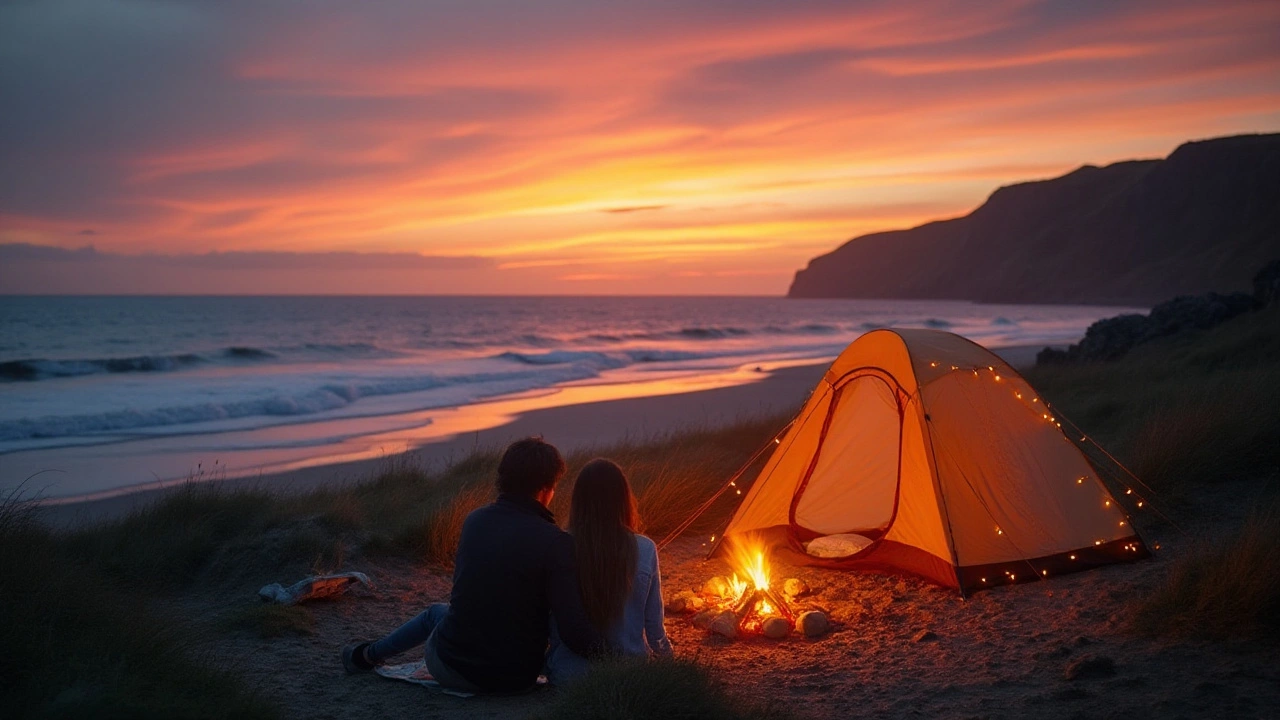
Popular Destinations
When it comes to camping in the UK, the diversity of landscapes offers something for every outdoor enthusiast. From the rugged beauty of Scotland's Highlands to the pastoral plains of Kent, each region presents unique opportunities for an unforgettable camping experience. The UK is dotted with campsites that cater to different tastes—whether you seek the tranquility of the countryside or the excitement of coastal adventures.
One of the most cherished camping spots is the Lake District. Known for its stunning lakes and verdant hills, this UNESCO World Heritage Site is a haven for hikers and nature lovers alike. The region boasts some of the most picturesque UK camping locations, where one can enjoy serene walks by Lake Windermere or catch a spectacular sunset from Scafell Pike. Although it's the ideal destination for an enthusiastic explorer, be sure to book in advance, especially during peak summer months, to secure your preferred campsite.
Heading south, the rugged coastlines and charming villages of Cornwall offer another remarkable camping destination. Famous for its dramatic cliffs and golden beaches, Cornwall's campsites provide direct access to some of the best surf spots in the UK. Places like Porthcurno and St Ives are not just popular among surfers but also among families looking to enjoy a peaceful retreat. With its mild climate, Cornwall remains a favored choice even during the cooler months. As the renowned naturalist David Attenborough once noted, "There are more treasures in British seas than most people realize."
For those intrigued by history and mythology, camping in Wales offers a chance to step back in time. Snowdonia, home to the highest mountain in Wales, is a place of legends and is steeped in the mystical tales of old. Its rugged landscape is a paradise for climbers and campers seeking a taste of adventure. Also notable is the Pembrokeshire Coast National Park, the only coastal National Park in the UK, where hikers can enjoy breathtaking views along the Coastal Path and campers revel in the rich biodiversity.
Scotland's Highlands provide more than just dramatic scenery; they offer an escape into the wild, untouched beauty of natural Britain. Here, the possibility of camping under the Northern Lights adds a magical twist to your journey. The vast expanse of Cairngorms National Park and the mystical Isle of Skye are beloved by adventurers and photographers alike. It's a place where the rugged landscape and swirling mists evoke the essence of Scotland itself.
In the southeast, the South Downs National Park is an appealing choice for those who prefer a gentler outdoor experience. This area is known for its rolling green hills and charming market towns. The booking campsites here often allow for short weekend escapes from the bustling life of London as well.
The UK's variety of campsites, each with their own distinctive attractions, ensures that whether you're an adrenaline junkie or a peace-seeking holidaymaker, there's a piece of British beauty waiting to be explored. To make the most of these popular destinations, understanding the best seasons, local rules, and popular times can greatly enhance your UK camping experience.
How to Book
Booking a campsite in the UK is relatively straightforward, yet it's a process that requires a bit of foresight and understanding of the terrain. To start, research is key. Exploring various online platforms dedicated to camping can give you a solid foundational knowledge about different campsites and their unique offerings. Popular platforms include Pitchup.com and Cool Camping, both of which provide extensive lists of campsites ranging from the rugged Scottish Highlands to the tranquil shores of Wales. These platforms allow campers to read reviews, check campsite facilities, and sometimes view pictures, helping them make an informed decision.
Once you identify potential campsites, the next step involves pinpointing the best time to visit. It's essential to consider seasonal variations, as well as local events which might affect campsite availability. Summer and school holiday periods are often peak times, so booking early is advisable. Comparing prices between competing sites can also save a few bucks, especially if you're booking for an extended stay. Many campgrounds offer discounts for early birds, which is beneficial for those planning ahead.
"The charm of a great camping trip is often in the planning," as noted by the Camping and Caravanning Club. "Understanding your destination and making necessary arrangements in advance can transform a regular outing into an unforgettable adventure."
When you've settled on the time and place, head over to the campsite’s official website or use a third-party booking website. Here, it's crucial to fill out all details accurately, including the number of people, vehicle type, and any specific amenities you might require. Most sites will ask for a deposit—a small commitment fee that secures your spot. While paying, ensure the payment gateway is secure to protect against potential fraud.
Communicating with the Campsite
Keeping communication lines open with the campsite operators can enhance your experience. Before your visit, reach out to them to confirm your booking and inquire about any recent changes in operations or facilities. This level of communication can ease any anxieties you may have, especially if you're new to a specific type of camping. Some operators are happy to recommend local attractions, supply lists, or maps that highlight nearby hiking trails. It can also be a chance to check if the site is dog-friendly if you're planning to bring along furry family members.
Aiming for a hassle-free booking experience doesn’t end with securing a spot, though. It continues by making sure you've got all access details. Many campsites now provide a digital welcome pack via email, containing precise arrival instructions, check-in times, and any security codes needed if the entrance is gated. Printing this information or having it saved on a device ensures a smoother arrival, leaving you with more time to relax and soak in the natural beauty of your chosen site.
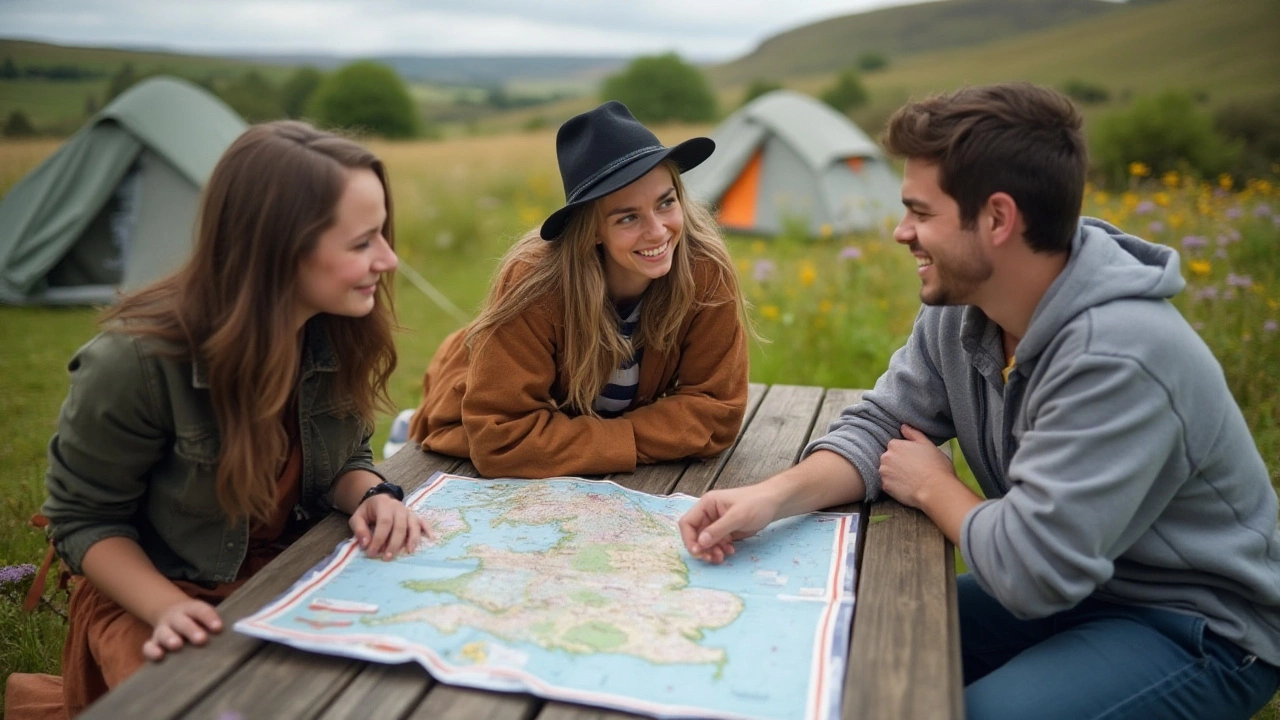
Tips for a Successful Booking
Successful campsite booking in the UK relies on a blend of information, timing, and some local know-how. To begin with, it’s essential to research your desired destination well before you plan to visit. Whether it's the rolling hills of the South Downs or the rugged beauty of the Highlands, each region offers its unique attractions and quirks. The popularity of campsites can vary significantly depending on their location, so familiarizing yourself with the characteristics of different campsites UK is vital. By understanding what each site offers—be it basic pitches or fully serviced caravan spots—you ensure that your chosen setting aligns perfectly with your camping needs and expectations.
Timing is crucial when it comes to booking. Peak times, such as school holidays and public holidays, tend to see a surge in demand, and many popular sites book out months in advance. It's wise to mark your calendar with these dates to give yourself a head start on those looking to make last-minute arrangements. Booking your campsite early can offer you a wider range of options in terms of dates and facilities, ensuring you can select a spot that enhances your camping experience. Keep an eye out for early bird discounts, which can sometimes sweeten the deal and make advance planning worthwhile financially. As Jim Lovell once said, "There are people who make things happen, those who watch what happens, and those who wonder what happened." The same applies to booking campsites UK—being proactive often pays off.
"Camping can take you to beautiful places on earth," shares Ben Fogle, renowned adventurer and broadcaster, "but preparation ensures you can fully appreciate the journey."
Leveraging technology is another vital tip. The digital age brings a plethora of tools to aid in the campsite booking process. There are numerous apps and websites dedicated to booking campsites across the UK. These platforms often offer reviews from fellow campers, providing insights into the quality and amenities of the campsite that aren't always visible from the official site descriptions. Moreover, setting up alerts or reminders for when reservations open can aid in securing those hard-to-get spots during peak season. It's also worthwhile subscribing to newsletters from your favorite campsites or camping networks, as they often inform loyal campers of special offers and available bookings first.
Another often overlooked tip is to stay flexible with your plans. Sometimes your first-choice site may not have availability, but with the myriad of campsites UK to choose from, there are always alternatives. Flexibility with dates and locations can open up fantastic opportunities for discovery that you might not have considered. If a particular site is full, don't hesitate to contact them directly—cancellation spots can often become available at short notice. It’s helpful to have a list of alternative sites just in case the original plan doesn't pan out. An adaptable spirit not only maximizes your enjoyment but adds an adventurous edge to your excursion.
Lastly, make sure you understand the terms and conditions of your booking. This includes cancellation policies, the specifics of check-in and check-out times, and any site rules regarding noise levels, pets, or campfires. It's better to be informed upfront than to encounter surprise fees or penalties. Knowing these details will save you from unexpected hassles and let you immerse yourself fully in the camping experience. Remember, successful planning transforms potential obstacles into smooth sailing, ensuring your journey into nature is marked by relaxation and joy rather than stress and misadventure.
Alternatives to Booking
So, you're ready for an outdoor escapade, but the notion of booking a campsite ahead of time is more stifling than comforting. Luckily, there are several alternatives available if you wish to keep flexibility at the forefront. First, consider the growing trend of wild camping, an experience that allows you to immerse deeply into nature without the confines of designated camping spots. Though it's important to note that in England and Wales, wild camping is technically illegal without landowner consent, certain wilderness areas in Scotland provide freer rein under the freedom to roam policy. Opting for wild camping requires you to practice responsible travel, ensuring you leave no trace of your visit—this means carrying out everything you take in, including waste.
Some campers find solace in last-minute site availability checks using campsite platforms or apps that list cancellations or new openings. This method can often land an excellent campsite UK booking, particularly during weekdays when demand is lower than weekends. Another delightful alternative is employing the hospitality of farmers or locals through schemes like 'Brit Stops' which allows campers to park at farms, pubs, and vineyards overnight. Such unique accommodations offer more than just a spot to pitch your tent; they sometimes come with charming extra experiences such as a farm-fresh breakfast or a chance to sample locally crafted brews.
If you're inclined towards a slightly different camping experience, glamping —or glamorous camping—could be your answer. It's an increasingly popular choice in the UK, offering the comforts of home along with the allure of nature. This can range from cozy yurts to sleek eco-pods. No need for advance booking makes it an attractive choice for impromptu adventures. Moreover, glamping spots are often located near breathtaking locales you might not discover otherwise, adding a sense of discovery to your travels. To quote the renowned travel writer, Robert Louis Stevenson, "I travel not to go anywhere, but to go. I travel for travel's sake. The great affair is to move." Glamping embodies this spirit, mobilizing the joy of discovery without the need for stringent planning.
Another noteworthy structure is utilizing hiking trails with lodgings along the way, like the Pennine Way or South West Coast Path, both heralded as some of Britain's finest walking routes. These trails minutely weave through urban centers and rustic villages, often accompanied by welcoming inns or motels, avoiding the necessity to pitch a tent altogether. For those flexible with their journey, this form of camping presents a dynamic way to venture across diverse landscapes while enjoying a well-deserved pint at the day's end.
Finally, for adventurers who prefer not to leave a digital footprint until the last minute, making friends within camper networks can provide invaluable leads. Many times, other travelers possess tidbits of information about secluded spots or off-grid camping wonders unknown to most. With the dynamism of this alternative, it fosters a continued mode of exploring where the journey becomes as thrilling as the ultimate destination. Creativity and resourcefulness go far in ensuring a fulfilling camping trip without the need for booking well in advance, offering an experience brimming with spontaneity and allure.
